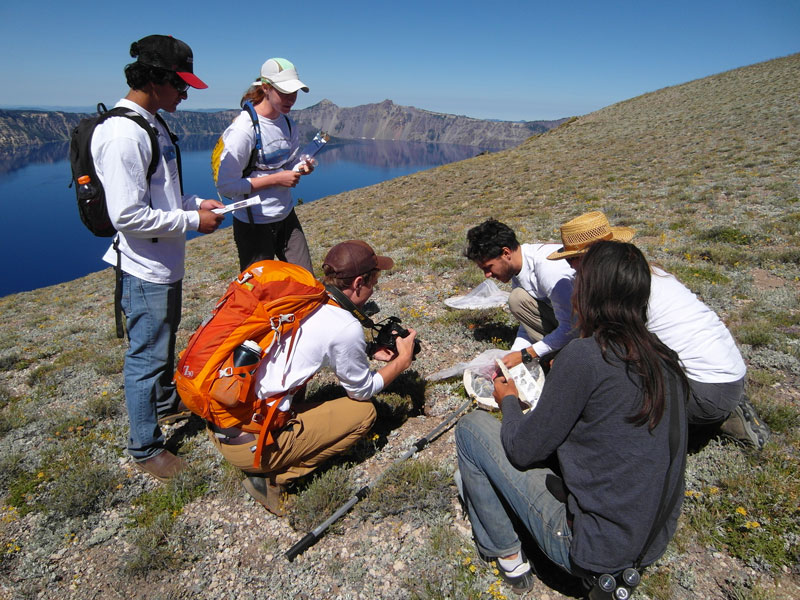Students analyze environmental conditions and problems through applied research and fieldwork, all within the stunning natural setting of the Klamath Basin.
Natural Resources Master Programs
What You'll Learn
A degree in Environmental Sciences prepares students for immediate employment and graduate studies in the assessment and monitoring of environmental conditions and problems, including research, monitoring, mitigation and restoration. The program focuses on applied scientific reasoning and methodology to study natural and human environments from interdisciplinary systems perspectives with strong emphasis on communication. The curriculum builds on four cores:
- data analysis: mathematics, statistics, R modeling, and geographic information systems (GIS)
- natural sciences: biology, chemistry, and physics
- technical electives: ecology (wildlife, plant, and forest), hydrology, soils, and natural resource management.
- integrated social sciences: economics, geography, and bio-regional studies
Upon completion of the program, students will have demonstrated the following outcomes:
- Attain applicable foundational knowledge, technical skills, and information literacy in several core areas of ecology, natural resources, & environmental sciences.
- Demonstrate geospatial literacy through the utilization of appropriate technology to identify and address environmental problems.
- Actively collaborate with local and regional agencies, organizations, and community members that represent a diversity of perspectives.
- Apply, interpret, and communicate appropriate analytical and statistical techniques to answer data driven scientific questions.
- Make and advocate for science-based and sustainable solutions to local and global environmental issues.
Meet The Faculty

Environmental Sciences encompass a broad range of opportunities for students after graduation which is why in their second year, students select a specific track to focus their education for their career aspirations. The BES program currently offers five tracks: Wildlife, Fisheries and Natural Resources; Water and Wetland Resources; Recreation and Science Ambassador; Environmental Business and Economics; Environmental Policy and Governance. General descriptions of the tracks can be found below or you can view the full curriculum for each track here:
Students within the Environmental Sciences program put their knowledge into practice in the best place possible—the great outdoors.
Starting with Introduction to Environmental Sciences in the first year, emphasis is placed on active experiential learning, which faculty members take seriously by introducing students to all that the Klamath Basin has to offer. The Klamath Basin is widely recognized as one of the most ecologically important watersheds in the United States. It is a spectacular place to study wildlife and natural resources with an incredibly high variety of organisms and habitats. It is the perfect home base for accessing outdoor experiences. If you want to merge your passion for being outdoors with a career in science, this is the program for you!
Careers
With 100% of Oregon Tech Environmental Sciences graduates either employed or seeking an advanced degree within six months of graduation, Oregon Tech graduates enjoy success thanks to the unique, in-demand knowledge and skill set they gain in our program.
Our faculty and partners are here to help you build an impressive resume of academic and work experience that will place you in the job or graduate program of your choice. Graduates can expect to find employment in federal, state, and tribal government agencies, non-governmental organizations (NGOs), and education and research institutions. Students are also well prepared to enter graduate school. Students graduating from our program have taken positions with the U.S. Geological Survey, U.S. Bureau of Reclamation, U.S. Bureau of Land Management, U.S. Fish and Wildlife Service, U.S. Forest Service, Oregon Department of Forestry, Oregon State Police Wildlife Enforcement, Klamath County Health Department, Klamath Irrigation District, Klamath County Soil and Water Conservation District, the Nature Conservancy, and JELD-WEN Windows and Doors.
The Environmental Sciences curriculum can also prepare students for specific professional certifications.
Our graduates work for:
Degree Required courses and recommended terms during which they should be taken:
To see the full list of track courses in the Oregon Tech catalog see the Environmental Sciences (Program Curriculum >) link below.
Featured Courses
The hands-on courses at Oregon Tech will help you explicitly prepare you for a career utilizing environmental science and technology. Some courses that a student at Oregon Tech might take include:
The Digital Earth
Introduction to the digital representation of the features and attributes of our natural world. Concepts, vocabulary, and use of GIS and GPS, and how these systems help solve geospatial problems. Integration of GPS data into GIS. Introduction to the use of various 'free-ware' software applications used for geospatial analysis.
Watershed Science & Technology
Science and technology of watershed processes, monitoring, and assessment. Applications and case studies focused on sustainable management and restoration of water resources and their associated aquatic, riparian, and upland ecosystems. Local and regional sites of interest are highlighted.
Environmental Science, Law, and Policy
Overview of legislative, regulatory, and policy-based activities involving the development, management, and restoration of natural ecosystem services. Emphasis is on the National Environmental Policy, Clean Water, and Endangered Species Acts, with illustrative case studies from local and regional environments.
Wildlife Ecology
Explore fundamental concepts and applied methods in the study of wildlife populations. Focus on study of wildlife habitat, animal movements, and wildlife diseases. Develop skills in wildlife data analysis, animal capture, marking and remote tracking.







